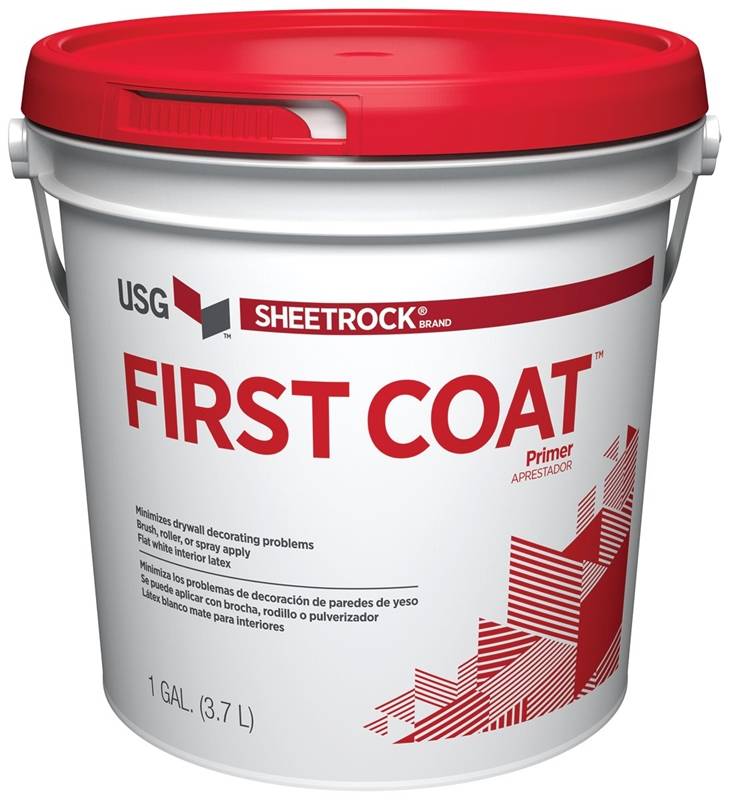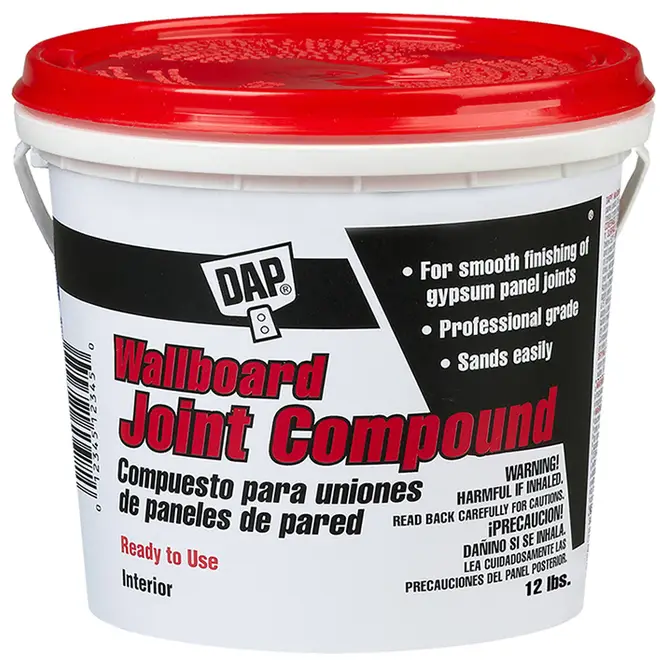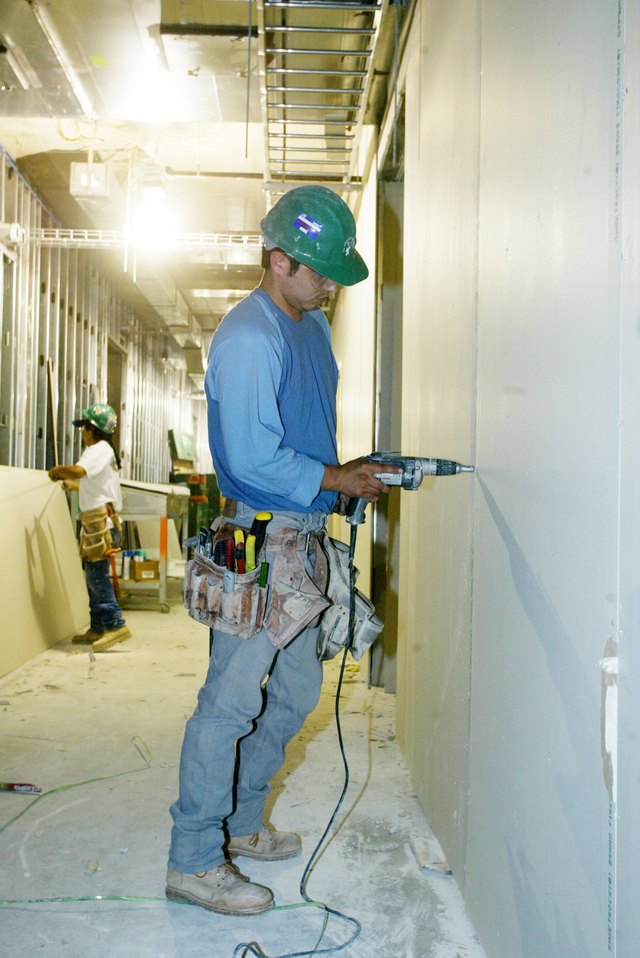
Create Awesome Things Joint Compound Wall Art Tutorial
Depending on the condition of your walls, you may also need a Plaster Magic repair kit, joint compound, acrylic caulk, mesh joint tape, four-inch putty knife, various-size taping knives, mud pan, 3/8-in. and 1/2-in. drywall, 1-5/8-in. coarse drywall screws, Plaster of Paris, a Phillips driver bit and a drill. Prepare the Space

Easy Finish® Joint Compound ProForm® Finishing Products
Add a little of the joint compound at a time and mix it in thoroughly using a drill with a mixer attachment. What you're really looking for is something with the consistency of cake or brownie batter. This will help the material spread and adhere to the wall properly.

DIY Joint Compound + Paint Sample Art Paint sample art, Paint samples
Step 1 - Sand the Seams Take a fine grit sandpaper and start sanding the seam area between the sheets of drywall. Sand the joint compound that has been used to cover the seams until the seams are flat and smooth. Use your hands to run over the seams after sanding to ensure there are no lumps or rises in the sanded surface.

Small acrylic painting with heavy texture, using joint compound
Most joint compounds have a smooth texture that easily bonds with different paints, making it easy to paint over the surface without first applying a primer beforehand. It's always better to prep your drywall surface before using the drywall compound at least 24 hours before you begin working on the paint job.

INSTALL DRY WALL, JOINT COMPOUND, TEXTURING AND PAINT! YouTube
Lightweight spackling compound: Contains fine aggregate with sodium silicate and an adhesive; designed for repairing smaller dings, holes, and cracks; doesn't sand well; only meant for quick, small fixes Standard/all-purpose spackling compound: Gypsum-based (similar to joint compound); repairs larger holes, gouges, and cracks in drywall Vinyl spackling compound: Fills in holes and cracks up to.

Best Joint Compound For First Coat Jacqueline Sanborn blog
1. Reuse or buy a wrapped canvas To start, you'll need to find a piece of canvas that matches the size of artwork you'd like to create. Preferably, I would have bought mine from a thrift store, but none of the canvas art pieces they had were close to the size that I needed.

Joint Compound Wholesale Pricing Paint Supply
Smooth the joint compound with a 6-in. taping knife. Feather the edges of the compound with the taping knife. Allow 24 hours to dry. If seams are still visible, repeat the process with a second coat. Repair any holes larger than 1/2-in.-dia. with joint compound and drywall joint tape. Cut the drywall joint tape one inch larger than the hole.

What Do You Do Before You Paint Over Joint Compound? Hunker
Knockdown texture: You can create a knockdown texture by applying joint compound (also known as drywall compound or drywall mud) to your walls or ceiling, then smoothing the stalactite-like peaks down with a knife. The result is a marbled texture that can then be painted any color. Knockdown texture is most popular as a ceiling texture.

joint compound mixed with acrylic paint on drywall. super texture
We like to stay on top of craft trends here at Handmade. One, in particular, caught Marianne's eye, and today, she puts it to the test. She is making wall ar.

Painting on Joint Compound Room For Tuesday
Introduction If you're going to paint the walls, you want them looking smooth. Tools Required Hammer Mud pan Pry bar Taping knife Utility knife Materials Required Aluminum drywall patch Drywall compound Drywall mesh tape Drywall paper tape Sanding sponge Sandpaper Stain-blocking primer

How to Use Joint Compound to Texture Walls Hunker Textured walls
Also known as mud or drywall mud, joint compound is a product that makes it possible to hide seams along walls, leaving the space looking finished and ready for painting. Used in conjunction with drywall tape, the product is relatively easy to apply, requiring only a small amount of effort.

DAP 10102 12 Lb Wallboard Joint Compound, Painting Supplies, Tools
Once my joint compound was completely dried. I started giving it a few coats of white paint in satin finish - that is what I had on hand-. Originally my idea was to add more color, but once I started with the white, seeing all of the texture from the joint compound come to life, color wasn't part of the picture anymore.

DIY joint compound art
Can you paint over the joint compound? You can paint over the joint compound, but you can't do it directly. You have to apply a primer coating before painting the joint compounds. The prime coating will make the compounds ready to absorb the paint like the drywall. In a word, you can paint over the compounds with a primer. Table of Contents
Create Awesome Things Joint Compound Wall Art Tutorial
Joint compound repairs and fills seams and nail holes in drywall. You can also use joint compound to repair cracked or damaged walls. You apply joint compound with a trowel or putty knife and allow it to dry before applying a second coat.

DIY joint compound art
A slightly damp rag is fine; just don't get it sopping wet or you risk wetting down the top layer of joint compound again (in most cases, it has to be completely dry for a solid 24-48 hours before you put up the primer - says so on the can, which may differ slightly depending on which you use). The best paint primer for drywall

DIY JOINT COMPOUND ART Textured canvas art, Abstract painting diy
Products mentioned in this article. 3m High Strength Small Hole Repair, Primer Enhanced Spackling Compound, 16 Oz.,Gray. Spackling, Joint Compound, Epoxy: Which is the Best for Filling Holes.